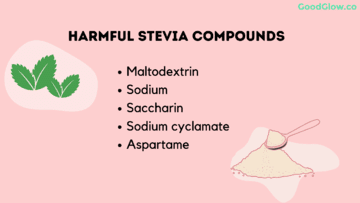Often used as a sugar substitute, today I’m taking a look at the benefits of Stevia and trying to answer the following question I often get from readers: can Stevia cause hormonal acne?
We all know about the dangers of sugar consumption when it comes to the condition of acne-prone skin. If you’re like me, as soon as you eat anything containing any ingredient ending with “ose”, it’s enough to cause a painful, irritating acne flare-up. Some argue that sugar replacements such as Stevia can help minimize these types of breakouts, but can Stevia cause hormonal acne? While these sugar substitutes might be calorie-free and less damaging to our hormones than regular sugar, it’s important to be aware of the risks these substitutes pose when trying to manage acne-prone skin. So, can Stevia cause hormonal acne?
Can Stevia Cause Hormonal Acne?
We know why sugar is bad for our skin – sugar causes our insulin levels to spike rapidly, which increases inflammation and turbo-charges our skin’s oil production, as well as the production of skin cells. We know to avoid sugar, even in the knowledge that sugar manages to find its way into almost everything – whether it’s certain white breads, sauces, or takeout food, we know we can’t trust that our food will always be sugar-free. So, what are the benefits of using a sugar substitute such as Stevia instead of sugar, and can Stevia cause hormonal acne just like sugar does?
What is Stevia?
Stevia is a natural sweetener used to flavor certain food products. Grown primarily abroad, Stevia (full name Stevia rebaudiana Bertoni) is related to the sunflower plant and is around 200 times sweeter in taste than regular white sugar. Stevia is used primarily to help those who are overweight regulate their weight problems and is also commonly used as a sugar replacement for those suffering from diabetes to help regulate their blood sugar levels.
Does Stevia Spike Insulin Levels?
Most major studies indicate that Stevia does not spike insulin – in fact, Stevia often works in opposition to how sugar functions by acting as an anti-inflammatory and regulating insulin production.
Benefits of Stevia as a Sugar Substitute:
- Provides the sensation of sweetness without the inflammatory response, which means fewer acne breakouts over time with regular use
- Can actually reduce inflammation, which helps clear the skin and reduce the appearance of existing breakouts
- Can help to lower cholesterol, which can help clear the skin: high cholesterol can cause acne breakouts
- Antioxidant benefits
- Can aid overweight individuals to manage sugar consumption and lose weight – regulating your weight is also another way to reduce acne breakouts
- Some studies have even found that Stevia can help to regulate blood pressure in those suffering from hypertension
With all these benefits, does that mean acne sufferers should use Stevia as a regular sugar replacement in their food?
My opinion is that Stevia should be used in moderation: while it can be helpful as a replacement for sugar, Stevia isn’t without its own disadvantages. In fact, what some critics of Stevia often point out is that the benefits of Stevia – such as those listed above – apply uniquely to the stevia plant in its pure, unrefined form – not necessarily to the forms of Stevia that you might find in diet soda drinks or low-fat desserts. Many stevia sweeteners are simply extracted compounds of Stevia – known as glycosides – which have zero health or nutritional benefits.
The best type of Stevia is pure Stevia, which you can find in the following forms:
- Stevia Extract (Purified)
- Green leaf stevia Leaf
- Stevia Blends
These forms of Stevia will help you keep all the nutritional benefits of the natural sweetener, without the negatives of consuming highly concentrated stevia extracts. You should avoid the following glycosides when buying a stevia product:

Can Stevia Cause Acne If Overused?
Given how present sugar is in so many daily food groups and products, you might be wondering: can Stevia cause acne if overused? The short answer is yes: some experts point out that while Stevia can be used in moderation to help acne sufferers cut back on sugar, Stevia itself can trigger acne problems when consumed in large quantities.
In the same way that acne-prone skin can overproduce oil when it is dehydrated, the body can also overproduce insulin when Stevia is overused. When we stimulate the body’s sweet sensors and trigger a spike in insulin in our bodies without any real sugar for the body to process, the body can produce stress hormone cortisol as a result. Cortisol can then also lead to an excess in oil production and yes, lead to acne breakouts. Fun, right?
Disadvantages of using Stevia as a sugar substitute:
- The benefits of Stevia are often greatly exaggerated when we consider that certain stevia sweeteners are simply extracts of the Stevia plant – studies have found that the extracts in these plants are around 400 times sweeter than regular white sugar
- Some acne sufferers might find themselves having allergic reactions to these heavily processed stevia extracts
- Overuse of stevia extracts can create a stress reaction in the body: stimulating the sweet sensors without providing sugar can cause the body to overproduce insulin and produce cortisol, both of which are damaging to the skin and will cause acne breakouts
When it comes to using Stevia as a sugar substitute, it’s best used in moderation and in its most pure forms. Aspartame-sweetened sodas are an obvious no when it comes to combatting acne: stick to green leaf stevia leaf and purified stevia extract.
It’s also important to always make sure to read the ingredients label when buying a stevia product: you might not realize that the manufacturer has stuffed lots of other inflammatory ingredients alongside the Stevia which are going to inflame your skin or cause a breakout. When picking out the right form of Stevia, the powder form of Stevia should only contain one ingredient ( Rebaudiana A, oft). If you’re picking out a liquid form of Stevia, it’s down to you to check the label for any ingredients that your skin might have a reaction to.
What Are The Best Natural Sugar Substitutes For Acne?
In the many years, I spent developing my anti-acne program and writing my eBook, I’ve tried almost everything when it comes to acne treatments: I’ve tried every “miracle” product on the market, and I’ve tried every skincare routine that promised me quick and easy results. The truth is, what we eat plays an essential role in combatting acne. Here are my recommendations for the best natural sugar substitutes for acne:
Stevia
If you enjoy using Stevia as a sugar substitute, you can continue to use it in moderation. Is Stevia good for acne? I can’t really say yes or no either way – green leaf stevia leaf and purified stevia extract can be beneficial anti-inflammatories and help regulate the body’s blood sugars, but Stevia can worsen acne if not used correctly. That being said, using Stevia in moderation is certainly better than using regular, processed table sugar.
Raw Honey
Another natural ingredient that can help combat acne and breakouts is honey. Honey is a natural antioxidant and can be used to sweeten everything from cakes and bakes to your morning cup of joe!
Dark chocolate
If you’re craving something sweet but don’t want to derail your acne treatments, a couple of squares of dark chocolate will quench your craving without creating a chain reaction of inflammation and breakouts. Dark chocolate contains powerful antioxidants and can even help the body regulate blood pressure and stress. If you are interested in reading further you can read my blog post about the benefits of dark chocolate for acne.
Pure Maple Syrup
100% Pure Maple syrup is another natural sugar that can be used in moderation when trying to combat acne. Pure maple syrup can be used to sweeten drinks or add to other meals – you can even add a bit of maple syrup to a fruit salad if you’re really craving something sweet. Do note that maple syrup must be completely free of other ingredients, and also do remember that it is quite high in calories – as, with all my recommendations, moderation is key.
The bottom line is this: what we eat plays a massive role in the management of acne-prone skin. As I explain in my eBook Unmasking Acne, certain foods that have been sold and marketed to us as healthy and “whole” foods are, in fact, contributing to our acne breakouts. If you want my opinion, the best way to get the right sugars into your body is to eat fresh, unprocessed fruit. I’m not talking smoothies or fruit juices, but real, whole fruit. In my eBook, I list over 170 foods based on their acne-inflammatory properties: I find the old adage “you are what you eat” to be true, especially when it comes to the condition of our skin. If you are interested you can check out my eBook here or access my list of acne-friendly food printables.


Every single time I use stevia … I get ACNE … only used for 2 days .. started breaking out like crazy … (and that was with a popular supplement liquid – with collagen) 1 tablespoon in the AM and 1 in the evening of the use. I additionally found stevia leaf in ‘Skinny Fit Tea’ also breaks out my skin. So does Truvia … just better for me too steer clear of anything with this sweetner, unless of course looking like one has been hit with a steak hammer becomes a fashion! LOL! Stevia I have also read, should not be used by those sensitive to daisy or ragweed.. same family of plants. Take care!